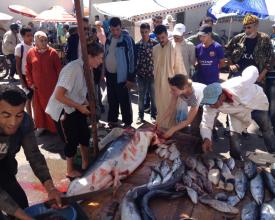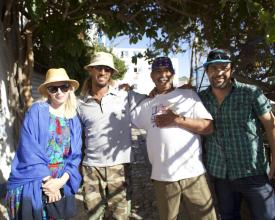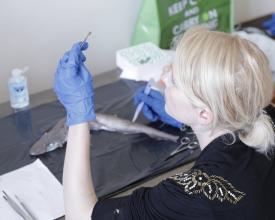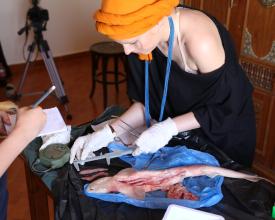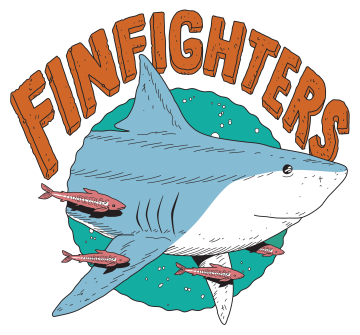
Fin Fighters shark investigation and citizen shark science program
Full Solution
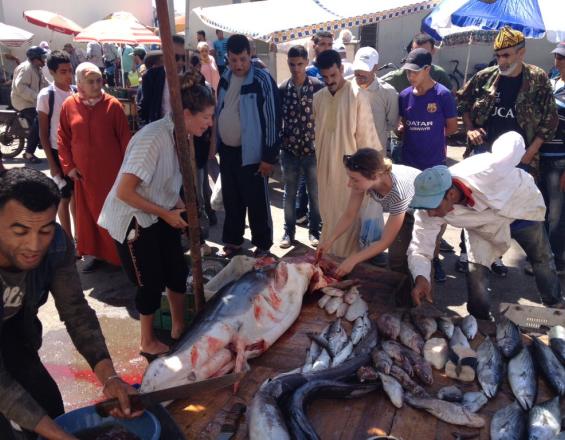
Fin Fighters
Fin Fighters is working with researchers and volunteers to collect information and genetic data from Moroccan fishing ports and markets. Results inform research on the impacts of shark and ray fishing and provide input for studies on populations and genetic health. In addition they are the basis for advisory management reports and educational programs. This is part of the larger Fin Fighters Citizen Shark Science program – a solution based approach to shark and ray conservation.
Last update: 08 Feb 2022
6566 Views
Context
Challenges addressed
- Elasmobranch species are heavily targeted by Moroccan & EU fishing fleetsLittle scientific data or landing data; population numbers are not understood.
- Unclear legislation with EU fisheries law resulting in low enforcement, making it a hot spot for shark finning/IUU fishing.
- Lack of understanding in artisanal fishing fleets of laws & restrictions.
- Little scientific studies due to lack of funding & incentives
Location
Morocco
North Africa
Process
Building Blocks
Citizen shark scientists
Volunteers are trained to conduct genetic sampling and necropsies and to gather data by monitoring landings and surveying fisherman. This creates an opportunity for conservationists and concerned citizens to have a positive impact and learn new skills for the benefit of species conservation. This has also enabled the collection over a wide area of a vast amount of viable data for scientific studies. Ultimately it means that Fin Fighters are able to provide a much needed data resource in data deficient areas for poorly understood populations.
The participants are trained to ID species from various body parts and to take ID images for our data bank. Some of our volunteers request to be taught more in-depth collection skills such as sampling either in situ on the ports, or in controlled environments. Others further their involvement by learning how to carry out necropsies and to extract samples of specific material – such as sperm, or stomach contents for later study. The volunteers (or Citizen Shark Scientists) are also taught how to survey fishermen, and fishing equipment, and to understand fishing methods.
Enabling factors
It is important that volunteers work well in a team and in high pressure situations to collect data that is controlled and that all reporting is carried out in a reasoned manner – without assumption.
Many of our volunteers have skills that can be useful in an investigation – such as a second language, or a past working in the fishing industry, this enables communication with fishermen and officials easier and helps to build confidence within the voluntary team.
Lesson learned
We have learnt that working in this way requires a great deal of patience and understanding of the different ways people process information. It has led to tailoring different learning activities to fit individual’s needs and in doing so has also taught us new techniques of describing the practical elements of our work.
Whilst Fin Fighters operate a democratic and fair approach to our investigative process – including every member’s opinion in our decision making; It is also necessary for the investigation for the director to maintain a leadership role throughout.
Ensuring every members voice is heard is important, but this then needs to be translated in to cohesive action and managed in a safe and proficient way – we found in the field that having a leader in final decision making and implementation way key to the success of the investigation process.
Data from landings and fishing surveys
Surveying fishermen allows a valuable insight to what is being landed across Morocco - and in what quantities, if species are effectively reported and if not why not, what methods are being used to catch elasmobranch species and if species are being heavily targeted for commercial purposes or simply by-catch.
Through this we have understood that many fishermen have little or no knowledge of laws and restrictions on shark/ray species and that many international and national trade/catch policies are not translated from management level to the fishermen themselves – who are unaware they are breaking laws.
We are therefore working with artisanal fishermen to establish the beginnings of a species education program and on basic training in DNA data collection from their landed catches.
Enabling factors
The most important element is communication. We had two translators on our volunteer team, French and Arabic speaking, which ensured that information was taken correctly. Every team member has to understand the situation they are faced with when meeting and discussing with fishermen. E.g. if a large protected species is being landed and sold –it is not appropriate to question the fishermen aggressively or to get in the way of their work, as this simply cuts of their desire to communicate with us
Lesson learned
In the future we hope for this to be made easier in some localities by obtaining more official sanctions from the fisheries ministers and port authorities – as many fishermen in Morocco can feel un-easy with women and scientists asking questions unless they are with a port official, however this is only the case in 1 in 5 ports.
Photography is often frowned upon in ports due to either religious beliefs or simply concerns with sanitation and officials worrying that they are being monitored on health and safety standards. It is always polite to ask before taking photographic evidence – however in certain circumstances it is necessary to obtain data – and this is usually a judgement call by the team or individual present.
Data for better enforcement
Fin Fighters works on the ground and is able to collect any evidence of IUU that may be occurring or is unreported. In the fishing ports and markets we are able to witness firsthand the sale and movement of any CITES listed species or evidence of illegal shark finning.
The evidence we have collected so far from the first 2 years of this 5 year study will be amassed and produced in reports (together with our genetic results and data) that will be presented to the fisheries officials and governing bodies. Our aim with this is to prove that despite restrictions and laws (such as CITES and ICCAT) being agreed to by Moroccan governance – they are currently not being managed or enforced effectively. We are currently producing an education scheme, that we hope the Moroccan fisheries ministers will approve (with the reports and fishermen surveys as evidence to back this up) that we will run out across the country in ports and markets. This will provide basic knowledge of different species and outline the laws and restrictions as well as give explanations for why they are necessary.
Enabling factors
It is important that we can provide quantitative as well as qualitative data for presentation to officials – so that the need for our program is clearly evidenced.
By producing evidence of consistent law breaking (unintentional and intentional) or problem areas where species are targeted – we can clearly show the need for specific areas to be addressed and programs to be established.
Lesson learned
The most important lesson we have learned in this work so far – is that the fishermen themselves may not be to blame for breaking the law, there is simply a lack of information and a definite lack of enforcement. We are hoping therefore to work with the fishermen to make the enforcement of the laws that protect their livelihoods more accessible and part of the every day.
It is necessary to exercise extreme caution when collecting evidence of rule breaking and not to act on this rashly or without certainty – this is the reason we are collecting evidence for reports rather than chasing prosecutions straight away; as often this can drive activities underground and make monitoring the situation much harder as well as promote the creation of black markets.
Scientific shark committee
Many of the Fin Fighters are non-scientists and do not have backgrounds in biology or conservation. We have therefore created a system of collaboration with scientists to produce a tangible and reasoned method of generating action for species conservation. We established a committee of shark scientists to share skills and bring new technology to shark conservation, and specifically to the Moroccan studies.
Working with scientists to collect data for their studies as well as for our own reports, ensures a circular needs based relationship: Scientists come to us with data requirements, we fill these by collecting data, which is then used in their scientific research, and the results are made available for Fin Fighters to use in pushing practical conservation or working to implement enforcement/policy.
In this way we are all working collectively to ensure our needs are met and any papers published credit Fin Fighters as an institution for data collection, which adds to our credibility.
Enabling factors
Many scientists have expressed frustrations as they feel that once a specific study is completed they have to move on to the next one without their concerns for the species being addressed or heard.
Conservation and science continue to drive each other. What we are able to do as conservationists with a broader agenda is to bring all the different areas of study together for a common purpose and even propose new areas of study for future scientific Investigation.
Lesson learned
It is not always easy to provide every scientist with exactly what they need, due to practical challenges, e.g. bad weather.
Sharing of data and research had been interesting as many scientists are reluctant to enter in to collaborations due to either being stung in their past by fellow scientists who have appropriated their work, or for many scientists they simply have never worked in this way with non-scientists. However this has been easily overcome by the nature of the committee and the positive steps we are all taking together to share our ideas and time. The progressive and results based approach Fin Fighters have, has reassured many scientists to our commitment and desire to be scientific and reasoned with our work.
Impacts
Over the last 3 years the Fin Fighters team has been able to establish links and successful collaborations with scientific institutions and individuals in need of data from either this region or specific species. Through this investigation Fin Fighters have also been able to generate new studies - such as the Morocco genetic baseline project. We have already begun establishing reports for presentation to Moroccan officials and aim to work with the fishermen and these officials to negotiate policy and scale up our educational program on a national level.
By establishing links with fishermen we have begun to involve them in collecting data and constructing educational programs. Many of these fishermen are now participating by providing continual information on their larger or more unusual catches via emails and photographs throughout the year.
Overall this program opens up dialogues between fishermen, conservationists and scientific communities and allows for understanding and solutions to be constructed for mutual benefit.
Beneficiaries
- Scientists receive data and information
- Volunteers gain specific skills
- The fishing communities are included in education programs and receive training thus gaining a better understanding of existing fishing policies
